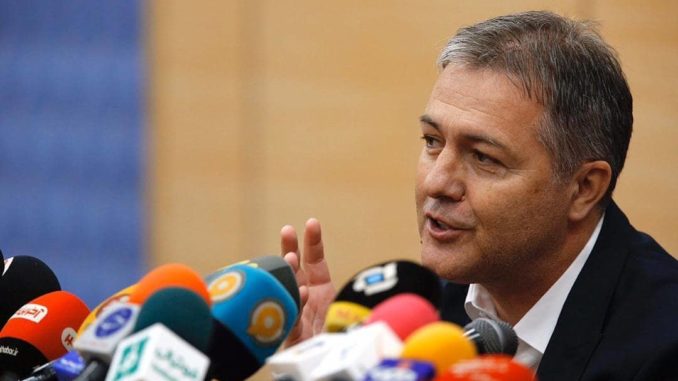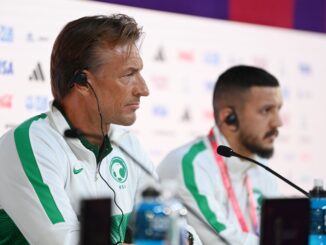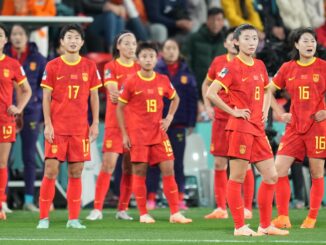
Portuguese manager, Carlos Queiroz, gone. Belgian Marc Wilmots, sacked within six months.
With the Iran national team on the verge of early elimination from Group C of FIFA World Cup qualifying, Iranian sport officials were once again on the hunt for a replacement. Time could not be wasted.
This time IFF officials were adamant on appointing an Iranian coach.
“An Iranian National team coach would be more familiar with league players, and would have a better relationship with club coaches,” they insisted.
The nominees that were publicly announced by the Sport Ministry started off with Zinedine Zidane and Jürgen Klinsmann, but ended up with local coaches such as Ali Daei and Amir Ghalenoie in matter of days.
So many jokes, trolls, and cartoons started lighting up social media, amusing up Iranian football fans. Iranian sports officials had made a fool of themselves with the handling of this appointment.
Iran’s national team was no longer in a strong position; demoted from top spot in the FIFA/AFC ranking, a position they had held for years under fan- favourite Carlos Queiroz, Team Melli was now ranked second in Asia after losing to Iraq in World Cup Qualifiers under the helm of Wilmots.
Iran desperately needed a guardian angel to save them from early elimination. After all, Iranian fans had been spoiled with back-to-back qualifications, and doing so comfortably, with Carlos Queiroz.
Who could be this Iranian hero? There were many qualified and experienced Iranian coaches from the Golden Generation of Iran (2000’s): Ali Daei, Alireza Mansourian, Mehdi Mahdavikia, Yahya Golmohammadi, Javad Nekounam, and even better UEFA-coaching certified Vahid Hashemian.
Yet, all were denied a chance to put their case forward by Iranian football officials and the list narrowed down to one; Sepahan coach, Amir Ghalenoei.
Sure, he has many titles under his belt. But his record and controversial time as national team manager at the AFC Asian Cup 2007 would raise doubts. So did the record of his teams’ under-performance in the AFC Champions League.
Many started questioning the decision. Why not Ali Daei, or Hashemian, with European football knowledge? Media questions were rebuffed.
Everyone was told the contract with Ghalenoei would be finalised any day, until a breaking news story changed everything.
As Iranian football fans were hooked on the Tehran derby between Perspolis and Esteghlal, a bombshell shattered the windows: “Dragan Skočić appointed as Iran national team manager on a 3-year contract.”
Skočić? The Croatian was not even in shortlist of coaches! He was not an “Iranian” coach as IFF had about boasted for weeks. Why him? He does not have any previous national team experience anywhere.
Questions were raised again; Skočić was a relatively known name among league followers, but he was always this low-key coach, having managed Malavan, Foolad, Khooneh be Khooneh and Sanat Naft in Iran’s Pro League and second-tier.
But even then, he never managed to win a league trophy with any of his teams. His best record in Iran was a third spot with a second-tier club, Khooneh be Khooneh, and failing to get them promoted to the Pro League.
Then slowly but surely, details came out from different sources, all reporting the same; that “Iran Football Federation had not made this decision”, and that a certain family member of (Government) officials had actually penned the deal with Skočić.
It had all happened in a meeting between the son of one of the officials, along with his agent, and another person, hosting Skočić in for the evening in a nice area of Tehran and making the decision to appoint Skočić as national team manager.
More damning information came from Ali Daei himself.
In an interview, the legendary player claimed: “I know who appointed Skočić. If you ask any of the IFF executive board members, you would realise none of them had suggested Skočić. In fact, three IFF board members called me after appointment and told me so.
“You can connect the dots to find out who sealed the deal with Skočić by finding out the first league match Skočić, after his appointment, rushed to watch in-person (Saipa vs Pars Jonoobi: hinting at Saipa CEO and IRGC militia, ‘Mostafa Modaber’).
Daei continued: “I know the ‘patrician’ who appointed Skocic. Unfortunately, ‘patricians’ are involved in some coaching appointments. There were ‘patricians’ involved in appointing Wilmots too.
“One has to answer, how Wilmots was signed with a contract fee of $3 million per year, whereas his previous salary was $750-850k in other countries. Also, Wilmots has also filed a complaint against Iran asking for $6m, so technically Wilmots had cost Iran $9m.”
Although Iran Football Federation has bypassed the financial and football troubles of Wilmots, there are reports emerging with details of Skočić’s contract, that entails: “if any of the two sides were to break the contract, they will have to pay in the amount of five months.”
With the current COVID-19 pandemic situation around the world, and no football games ‘until end of 2020’, as hinted by the vice-president of FIFA, everything is in limbo regarding Skočić’s appointment.
Iran’s World Cup qualifying fixtures are going to be further delayed, and the first phase of Skočić’s contract will simply pass by. Technically, IFF is paying for a coach, when there is no league or national team games going on.
As if all this was not enough, in recent days, former IFF President, Ali Kafashian, dropped a bombshell in an interview with a local newspaper, stating: “In a way, we (IFF) were forced to select Afshin Ghotbi (former national team manager), just like Skočić.”
It was a brave statement made by a former IFF official.
Kafashian continued: “When Ghotbi was in charge, a lot of national team players were complaining about the qualifications of Ghotbi as a coach and that he can’t manage the team well. Just like now that IFF is forced to sign a deal with Skočić, we too were forced to sign with Ghotbi.”
It would be cynical to think that the former IFF President’s recent revelation is surprising or new information for Iranian football fans. For years it was, and still is, Government officials of the Sport Ministry making the decisions for football.
It even got to the point of Iran’s former President making the call for sacking of Team Melli’s coach.
Yet, no football officials had ever publicly admitted to Government officials or the Sports Ministry making the call for Iranian football.
And that is a good first step in the right direction; to identify and root out the Government and IRGC militias’ Godfather role in Iranian football. Once and for all.
Photo: IG/coach_skocic
Listen to Mehdi Mahdavikia talk about the state of Iranian football on Episode 53 of The Asian Game podcast.




